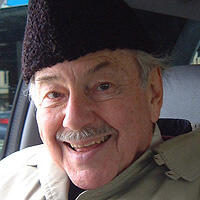Story originally published by USC News on 3/05/09.
By Pamela J. Johnson
George Oakley Totten III, Distinguished Professor Emeritus of Political Science at USC College, whose life’s research promoted peace in the Pacific Rim and worldwide, has died. He was 86.
Totten died of heart failure on March 2 at his daughter Vicken Totten’s home in Shaker Heights, Ohio. After suffering a stroke in early 2008, he moved from Los Angeles to the home of his eldest daughter, a doctor.
“My father was an extremely gentle person,” said the younger of his two children, Linnea Totten-Day. “He was fun-loving, open, interested in everything. He loved people and sharing his passion for world peace.”
Director of the USC Korea Project and founding director of the USC-UCLA Joint East Asian Language and Area Studies Center, Totten was a former director of the USC East Asian Studies Center and Department of Political Science chair.
Fluent in Japanese, Swedish, Chinese, French, German and other languages, he authored, edited or translated 35 books and more than 80 articles related to East Asian politics in Japan, Korea and China.
Totten joined the College in 1965, retiring in 1992 after 27 years. He remained active, earning a USC Faculty Lifetime Achievement Award in 1996. A year later, he delivered the Albert and Elaine Borchard Lecture titled “What Can be Done to Establish Peace and Stability in Northeast Asia?”
He also studied the Asian languages system for Romanization – the representation of a written or spoken word with the Latin alphabet. Despite failing health in the summer of 2008, he traveled to Shanghai to present a paper on the Romanization of Chinese.
“George was a wonderful scholar and teacher, but more importantly he was a kind and gracious colleague,” said Howard Gillman, the USC College dean, a professor of political science and Totten’s friend for nearly two decades. “I’m very sad about his passing. His loss is deeply felt by all who knew him.”
Ann Crigler, chair of political science at the College, called Totten a quintessential scholar.
“He was a scholar’s scholar,” Crigler said. “He had such passion for his research and his scholarly work. His enthusiasm was infectious.”
Stan Rosen, professor of political science and director of the East Asian Studies Center, was highly influenced by Totten, who in 1979 recruited him from the University of California, San Diego.
Rosen recalled how Totten invited Kim Dae-Jung to speak at USC about the reunification of Korea. A few years later, Kim was elected president of South Korea. Totten nominated Kim for the Nobel Peace Prize, which Kim received in 2000. Totten and his second wife, Lilia, celebrated the award with Kim in Oslo.
Rosen also remembered Totten’s enthusiasm for the subjects of his research. Totten at times wore colorful, elaborate costumes representing China, Japan or Korea during dinners at his home or during scholarly meetings at USC or elsewhere.
“He was a unique character,” Rosen said.
Unique, too, was his broad knowledge in politics surrounding China, Japan and Korea, Rosen said.
“It’s very rare to find a scholar with such expertise in so many areas,” he said.
Born July 21, 1922, in his parents’ home in Washington, D.C., Totten was the first child of an American architect of embassies and a Swedish sculptress. Totten’s interest in Japan began as a child growing up in a house with a Japanese palace room. Built around the Shining Prince Genji theme in Tokyo in 1895, the room – an extension to their new house – was presented to his mother as a wedding gift by his father.
In 1941, at age 20, after the Japanese bombed Pearl Harbor, Totten joined the Army. His language skills prompted his deployment to interrogate Japanese prisoners of war on Moratai, an Indonesian island belonging to the Netherlands.
Although the target of gunfire, he remained uninjured when his division was ordered to invade Mindanao, a Japanese-held island in the Philippines. After Japan surrendered, he and others oversaw thousands of Japanese prisoners.
Totten shared with prisoners the Song of Ariran: A Korean Communist in the Chinese Revolution, a book about the history of the Korean independence movement and the Chinese Communist movement of the 1930s.
“The POWs who read the book came to understand that the enemies they had been fighting were really as human as they, themselves,” Totten said in a 2009 New Year’s letter to friends.
After the war, in 1948, Totten married Astrid Maria Anderson and had daughters Vicken and Linnea. He earned a master’s from Columbia University and a Ph.D. from Yale University. The couple was married for 27 years before Astrid died in 1975.
Totten later married Lilia Li, a Chinese journalist with a daughter, Blanche Ma-Luk Lemes. They were married for 28 years before Lilia died in 2004.
He spent his final years re-editing and updating the Song of Ariran, written by Helen Foster Snow.
In addition to his daughters and stepdaughter, Totten is survived by six grandchildren. A memorial service is being planned in Los Angeles this summer, likely in July. E-mail Vicken.Totten@Case.edu for more information.
Donations in Totten’s name may be made to USC College, the U.S.-China People’s Friendship Association and Choate Rosemary Hall:
University of Southern California
College of Letters, Arts & Sciences
Department of Political Science, VKC 327
3518 Trousdale Parkway
Los Angeles, CA 90089
(213) 740-6998
usc.edu/posc
posc@usc.edu
President U.S.-China People’s Friendship Association
Robert Sanborn
402 East 43rd St.
Indianapolis, IN 46205
(317) 283-7735
robert@uscpfa.org
Info@USCPFA.org
Choate Rosemary Hall
Choate Rosemary Hall Development Office
333 Christian St.
Wallingford, CT 06492
www.choate.edu

